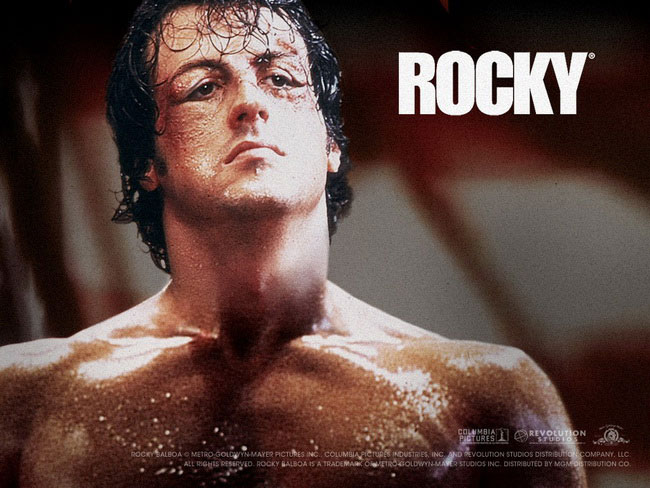Recently, I watched all six Rocky movies back to back (yes, even Rocky V). I somehow managed to skirt around those movies throughout my child- and young adulthood. Boxing movie? Something about some steps in Philly? Eh.

When someone finally convinced me to sit down in front of the first Rocky about two weeks ago, I was mesmerized. Never being particularly athletic, I saw the Rocky films not as bombastic boxing movies, but through a different lens—that of a writer watching an intricate character study.
No, seriously.
The Rocky movies achieved lasting popularity as a result of the hugely effective group of main characters. Here are five tips about characterization I learned while watching:
5. Keep your character’s core motive simple, then add layers of complexity.
Under the constant drumbeat of “be original,” and admonishments to stand out in a crowded marketplace, aspiring writers tend to draw main characters as intricate as Chantilly lace, all shadows and baggage.
Trouble is, too much of the main character’s essence gets obscured by layers of backstory.
From a tough Philadelphia neighborhood in the early ‘70s, Rocky Balboa just wants to make it out of his filthy apartment and dead-end job. A small-scale club boxer, Rocky wants nothing more than to do something big. When Adrian asks him, “Why did you want to be a boxer?” Rocky answers, “Because I can’t sing or dance.”
It really can be that simple.
4. Hit every emotion, even during ‘non-essential’ scenes.
Never miss an opportunity to show your character reacting to things. During the Thanksgiving scene in the original Rocky, Paulie and Adrian have a screaming match. Through it all, you can see Rocky stage left awkwardly shuffling his feet, an accidental audience to this private family fight.
Here, we’re watching all three characters develop even though the central story arc would have been fine without it (Rocky could’ve just pestered Adrian into going ice-skating without all the yelling). You see Paulie’s washed-up insecurity, the root of Adrian’s social maladaptation and Rocky getting a taste of what he’s in for as part of this dysfunctional little family.
3. Don’t change the rules offscreen.
When Rocky does things out of character (like flubbing his training before fighting Clubber Lang) the audience can see, or at least take an educated guess, about why. But it can be confusing when your creations do things that are out of character, seemingly without reason. This means some sort of seismic shift in the character’s moral compass occurs offscreen.
When your character makes a decision to start a new pattern of behavior, give your reader the reason why. A job loss? A new love interest? Witnessing something tragic? Whatever it is, let it happen in front of the reader, so we don’t get lost or distracted along the way.
2. Know which mountains to fly over.
Rocky Balboa doesn’t have much of a backstory. Where are his parents? In Rocky V, when Tommy Gunn, Rocky, Adrian and Robert Jr. are sitting at the dinner table, Rocky makes a passing reference in response to Tommy’s recollection of an abusive, alcoholic father: “Yo, Tommy, at least you had an old man to knock out, you know? I didn’t even have that.”
Other than that bit of color, we hear nothing about Rocky’s parents—and that’s okay.
Letting parts of your character be a blank canvas isn’t careless writing—it’s respect for the reader. Providing a complete backstory (unless you’re J.R.R. Tolkien and that backstory is The Silmarillion) can feel like you’re controlling all the cameras and holding all the cards. Great reading experience for you, bad one for your readers.
Also, that’s a lot of extra work.
1. Let your character get beaten—a lot.
Spoiler alert: Rocky doesn’t win his last fight in the first movie. In fact, Rocky loses almost half the fights we see on camera, including one in which he’s knocked out three rounds and about 45 seconds into his first fight with Clubber Lang in Rocky III. And this is a good thing.
Who wants to identify with someone who does nothing but win?
I mean, you might like that person, and he or she could be a deus ex machina for your story arc, but that kind of Norse-god-warrior -superhuman-cyborg infallibility doesn’t lend itself to a main character who sticks around or that inspires affection or loyalty from most readers. Don’t be afraid to let your protagonists fail, fail often, and fail in epic fashion. We love it!
~–~
In the end, it can be easy to dismiss movies like the Rocky franchise as testosterone-soaked pseudoepics that are too simple by half. But taking some cues from Rocky Balboa can help your main characters pack huge punch (pun totally intended) and resonate with your readers.
What did you think of the Rocky movies? What movies have most inspired or informed your writing? Share them in the comments.
